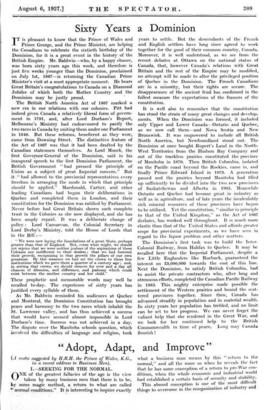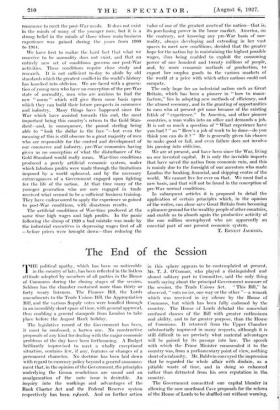"Adopt, Adapt, and Improve"
(A motto suggested by H.R.H. the Prince of Wales, K.G., in a recent address to Business Men). I.—SEEKING FOR THE NORMAL. tA NE of the greatest fallacies of the age is the view - taken- by many business men that there is to be, by some magic method, a return to what are called f' normal conditions." It is interesting to inquire exactly what a business man means by this " return to the normal," and all the more so when he reveals the fact that he has some conception of a return to pre-War con- ditions, when the whole economic and industrial world had established a certain basis of security and stability. This absurd conception is one of the most difficult things to overcome in the reorganization of industry and commerce to meet the post-War needs. It does not exist in the minds of many of the younger men, but it is a strong belief in the minds of those whose main business experience was gained during the years from 1900 to 1914.
We have first to realize the hard fact that what we conceive to be normality does not exist, and that an entirely new set of conditions governs our post-War activities. These conditions require close study and research. It is not sufficient to-day to abide by old standards which the greatest conflict in the world's history has knocked into oblivion. We are faced with a genera- tion of young men who have no conception of the pre-War state of normality, men who are anxious to find the new " norm " which will give them some basis upon which they can build their future prospects in commerce and industry. Many things have happened since the War which have assisted towards this end, the most important being this country's return to the Gold Stan- dard—and, in consequence, the pound sterling being able to " look the dollar in the face "—but even the meaning of this is still obscure to a great majority of men who are responsible for the control and development of our commerce and industry, pre-War economics having given us no conception of what the disturbance of the Gold Standard would really mean. War-time conditions produced a purely artificial economic system, under which fabulous profits were made through the limitations imposed by a world upheaval, and by the necessary extravagances of a Government engaged upon fighting for the life of the nation. At that time many of the younger generation who are now engaged in trade received what seemed to be a sufficient business training. They have endeavoured to apply the experience so gained to post-War conditions, with disastrous results.
• The artificial conditions of War-time prodUced at the same time high wages and high profits. In the panic following the slump of 1920 a had mistake was made by the industrial executives in depressing wages first of all —before prices were brought downthus reducing the value of one of the greatest assets of the nation--that is, its- purchasing power in the home market. America, on the contrary, not knowing any pre-War basis of nor- mality, always developing and extending_ in her vast spaces to meet new conditions; decided that the greater hope for the nation lay in maintaining the-highest possible wages, thus being enabled to exploit the consuming power of one hundred and twenty millions of people, and, by more economic methods of production, to export her surplus goods to the various markets of the world at a price with which other nations could not compete.
The only hope for an industrial nation such as Great Britain, which has been a pioneer in " how to manu- facture," lies in adopting new methods of efficiency, and the utmost economy, and in the granting of opportunities to men who at present get none because of the existing fetish of "experience." In America, and other pioneer countries, a man walks into an office and demands a job. It is not so much a question of " What experience have you had ? " as " Here's a job of work to be done—do you think you can do it ? " He is generally given his chance to make good or fail, and even failure does not involve his passing into oblivion.
We are at present, and have been since the War, living on our invested capital. It is only the invisible imports that have saved the nation from economic ruin, and this is mainly due to the foresight of our ancestors who made London the banking, financial, and shipping centre of the world. We cannot live for ever on that. We must find a new basis, and that will not be found in the conception of pre-War normal conditions. In subsequent articles it is proposed to detail the application of certain principles which, in the opinion of the writer, can alone save Great Britain from becoming a pleasure ground for the wealthy people of other countries, and enable us to absorb again the prOductive. activity of the one million unemployed who are apparently an essential part of our present economic system.
T. EltNEST JACKSON.







































 Previous page
Previous page